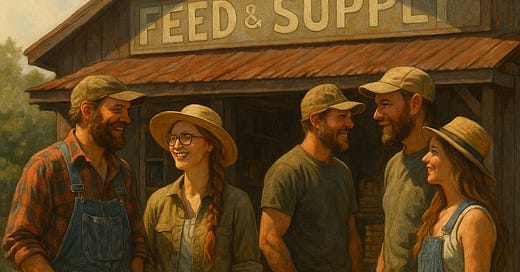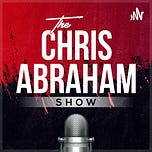Let’s admit something up front: this isn’t new. None of this is new. The homestead fantasy—of retreat, of reconnection, of self-reliance—is older than the internet and more persistent than ideology. From Thoreau’s cabin to Clarkson’s Farm, we’ve always romanticized the person who gets out, grows their own, and learns to fix their own broken septic tank (that’s the word you were looking for, by the way).
What is new is who’s showing up.
Because it’s not just hippies anymore. And it’s not just red-state preppers. It’s not even just bored millionaires with vineyards and vanity goats. It’s the ex-tech worker. The burned-out nonprofit director. The Stanford MBA with three chickens named after French existentialists. It’s TikTok’s favorite lesbian chainsaw couple. It’s the off-grid Catholic dad in Tennessee whose kids know Latin and how to clean a fish. It’s your ex-girlfriend who used to run canvassing operations for Bernie but now posts photos of her herb spiral and rain barrel with the hashtag #blessed.
This is no longer niche. This is becoming default.
Escaping the Grind Isn’t Political. It’s Emotional.
You can call it post-pandemic burnout. You can call it a Malthusian impulse. You can call it “The Great Unsubscribing.” But the deeper truth is this: people are exhausted by complexity they can’t touch. They’re done being “plugged in” while feeling hollow. They’re craving something tactile, seasonal, real. And they don’t care if the guy selling eggs next door has a Gadsden flag or a "No Justice, No Eggs" sign—so long as the eggs are fresh and he helps dig their car out after a storm.
This isn’t ideological migration. It’s emotional relocation.
From Hustle to Harvest: The YouTubeification of the Modern Farm Fantasy
Log on to YouTube right now and you’ll see it: thousands of accounts documenting the same arc. A couple leaves the city. They buy land. They try to build a chicken coop. Chickens die. They cry. They try again. They overplant kale. They get too many eggs. They build cold frames. They freeze. They thaw. They butcher. They bake. They cry again. And by the end of it, you’re watching not because they’re experts—but because they’ve become real in a way influencers never were.
Some wear overalls and talk about Christ. Others wear beanies and talk about food sovereignty. But they all end up talking about compost. They all fall in love with their land. And they all end up relying not on supply chains, but on Billybob and Joebob, who own the tractor, know how to fix the well, and don't care how you voted in 2016.
Because out here? Your political takes don’t matter if your pipes freeze.
Neighbor Over Party: The Rise of Tactical Trust
The deeper shift is cultural. It’s not that people have abandoned their values. It’s that they’ve realized ideology doesn’t milk goats, stack firewood, or run emergency diesel during a blizzard. Community isn’t a party platform. It’s who shows up when your generator fails.
In rural life, your network gets small and hyperlocal. And that’s not a bug—it’s the whole point. These aren't the same as urban “intentional communities” or commune throwbacks. This is the accidental village. The neighborhood coop. The post-collapse rehearsal. The place where your survival—and your peace—depend more on shared irrigation schedules than political alignment.
You learn fast: you can’t DoorDash your way out of a broken fence. Amazon Prime doesn’t deliver feed. Instacart isn’t coming down your half-mile gravel road. And if you think cops are going to make it to your property in under 45 minutes? Think again. You are your own supply chain. Your neighbor is your FEMA. You build relationships or you don’t make it.
The End of the Urban Bubble
Remote work—especially post-2020—was supposed to be a freedom dividend. But for many, it’s become a one-way ticket out of the cities that used to shape them. And with Starlink and solar and composting toilets and freeze dryers and bulk animal feed? The infrastructure for exile now fits in a pickup.
And here's the twist: when you unplug from the city, you unplug from the algorithm, the culture war, the grievance cycles. Not entirely, but enough to breathe. Enough to look someone in the eye without scanning them for tribal markers. You stop reading vibes. You start noticing weather.
The Tradwife and the permaculture queer elder are no longer opposites. They're neighbors. They're bartering eggs for sourdough starter and watching the sky together to guess the first frost.
This Isn’t the End of the World. It’s the End of Pretending.
The eschaton hasn’t come. But the illusion of security has cracked. And what’s left, after the screen fades and the noise dies down, is land. Seed. Sweat. And maybe someone you never thought you’d trust, holding a shovel next to you.
Out here, the internet is a memory. But the compost is real. And the coop needs fixing. Together.
tl;dr
The provided text explores a growing trend of individuals leaving urban environments to embrace a farm-based, self-sufficient lifestyle. This shift is not primarily ideological or political, but rather an emotional response to feeling overwhelmed by modern complexity and a desire for tangible, real experiences. The text highlights how this movement attracts a diverse range of people, moving beyond traditional stereotypes, and emphasizes the importance of local community and practical skills over political alignment for survival and well-being. Ultimately, it suggests that this return to the land represents an acceptance of reality and interdependence in an increasingly uncertain world.













Share this post